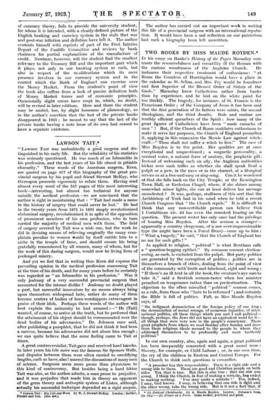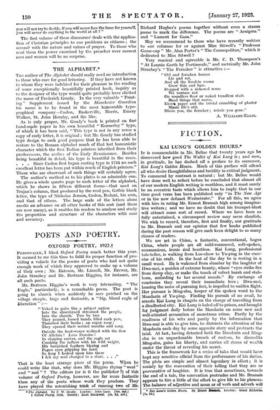TWO BOOKS BY MISS MAUDE ROYDEN.* IN his essay on
Ranke's history of the Popes Macaulay con- trasts the resourcefulness and Versatility Of the Roman with the curious woodenness of the Anglidan Church. He instances their respective treatment of enthusiasm : " at Rome the Countess of Huntingdon would have a place in the calendar as St. Selina, and Mrs. Fry would be foundress and first Superior of the Blessed Order of Sisters of the Gaols." Macaulay knew Catholicism rather from books than by experience, and he laid on the white paint far too thickly. The tragedy, for instance, of St. Francis is the Franciscan Order ; of the Company of Jesus it has been said that the first generation of its fathers were saints, the second theologians, and the third Jesuits. Rule and routine are terribly efficient quenchers of the Spirit : how many of the great figures of Catholicism have been " made eunuchs of men " 1 But, if the Church of Rome mutilates enthusiasm to make it serve her purposes, the Church of England proscribes it, applying in this connexion the Mosaic Laiv against witch- craft—" Thou shalt not suffer a witch to live." The case of Miss Hoyden is to the point. Her qualities arc at once exceptional and unquestioned ; a magnetic personality, a musical voice, a natural force of oratory, the prophetic gift. Instead of welcoming such an ally, the Anglican authorities bicker over such trifles as whether she shall speak fioni a pulpit or a pew, in the nave or in the chancel, at a liturgical service or at a free-and-easy or sing-song. Can.it be wondered at that she falls back on the City Temple, or the Kensington Town Hall, or Eccleston Chapel, where, if she shines among somewhat minor lights, she can at least deliver her message unmolested ? It was, perhaps, stuffiness of this sort that the Archbishop of York had in his mind when he told a recent Church Congress that " the Church repels." It is difficult to
think that any non-certifiable person can believe that 1 Corinthians xiv. 34 has even the remotest bearing on the question. The present writer has only once had the privilege of hearing Miss Hoyden. After the sermon a stranger— apparently a country clergyman, of a not over-impressionable type (he might have been a Dural Dean)—came up to him :
" What sk tragedy," he said, " that the Church of England has no use for such gifts ! "
As applied to religion, " political " is what Bentham calls a " question-begging epithet." By common consent election- eering, as such, is excluded from the pulpit. But party politics
are generated by the corruption of politics ; politics are in themselves a branch of ethics, dealing from the point of view of the community with'truth and falsehood, right and wrong :
"If there's an ill text in all the book, the creature's aye sure to take it," said a Scottish sermon-taster when her minister preached on temperance rather than on predestination. The objection to the often miscalled " political " sermon comes, as a rule, from those who "hate to be reformed" ; and certainly the Bible is full of politics. Full, as Miss Maude Hoyden says, of
" the indignant denunciation of the foreign policy of one king ; the denunciation of moral wrongs, of economic injustice, of inter- national politics, all these things which you and I call political— though, perhaps, the Jews did not have an equivalent word for k- ali things that were very sore in the people's conscience. Those great prophets from whom we read Sunday after Sunday and draw from them religious ideals seemed to the people to whom they addressed themselves to be profoundly and most tactlessly political."
In our own country, also, again and again, a great political has been inseparably connected with a great moral issue : Slavery, for example, or Child Labour ; or, in our own time,
the cry of the children in Eastern and Central Europe. For the Church to lihirk such questions is cowardice.
" A preacher has this responsibility. There is a right side and a wrong side to them. There are good and Christian people on both sides. Yes, that is true. But this is also true : that one side was wrong. I think the Church, in fear of making a mistake, haj ended in making nothing. ' You may make a mistake !: Yes, indeed, I may, God knows. I may, in believing that one side is right and the other wrong, take the wrong side. But is it not a fact that, if • (1) Political Christianity. By A. Maude Boyden. Loudon: Putnam's Sons., [3s. Od,3—(2) Prayer as a Force. Same author, publisher and price. you will not try to decide, if you will never face the issue for yourself, you will never do anything in the world at all 1"
The first volume of these discourses' deals with the applica- tion of Christian principles to our problems as citizens ; the
second2 with the nature and values of prayer. To those who read them the power exercised by the preacher over earnest
men and women will be no surprise.











































 Previous page
Previous page